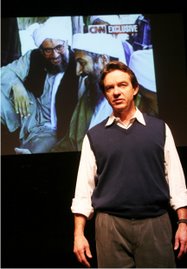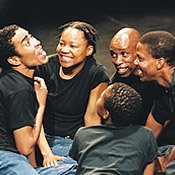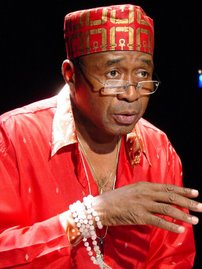But first a lighter fare: Schlock-talker Michael Savage lays into Islam, in a seriously scary way, and doesn't get the Imus routine as a result. Why? Because he laid into Islam, and America right now is afraid of Islam, even if most Muslim-Americans are law-abiding moderates (as are most [insert major group]-Americans).
I hope other minorities are helping Muslim-Americans fight back. Michael Savage was already a grade-A jerk, but his bizarrely fever-pitched screed against Muslim-Americans set a new standard for quasi-mainstream Islamophobia.
Just ask yourself, seriously: Would any on-air personality be allowed to say the same things (that we should deport all of them, that they should shove their religion up their behinds) of Jews, Christians, Buddhists, or atheists? He wasn't talking about jihadis - he was talking about all Muslims, a pretty big group.
Anyway, Culture Project's upcoming play Betrayed by New Yorker writer George Packer looks at how the U.S. military and the Bush people essentially betrayed many of the Iraqi interpreters and other aides they hired.
The play's fantastic (we've had a few readings) and Packer's nonfiction accounts of his time in Iraq - ranging from The Assassin's Gate to the article that inspired the play - is definitely worth reading.
But it saddens me to read, in today's New York Times, just how venerable our history of abandoning our allies really is. Short version: To fight communism in Laos and Vietnam, the CIA hired thousands of Hmong warriors (from Laos), then abandoned them when the communists won. The U.S. troops came home, in various states of disrepair. The Hmong were already home, and their socialist government couldn't have been more pissed at them.
Cut to thirty years later. The former fighters are aging; their families now guilty by relation. They move around every few weeks, hiding, and endure irregular skirmishes with the Laotian army. The government of Laos denies that ex-CIA Hmong exist in the jungles, blaming such rumors on "bandits." The Times's pictures prove otherwise.
Also not fun: Iraqi Associated Press photographer Bilal Hussein was held by U.S. forces for twenty months without being charged with a crime, then released into the care of an Iraqi magistrate. The magistrate will determine whether or not Hussein is an insurgent. He has still not been charged.
Hussein's lawyers "were not given a copy of the materials that were presented and which they need to prepare a defense." The AP has fought vigorously for Hussein, with little luck. The military says Hussein helped insurgents. But Hussein hasn't been charged with that crime or with any other.
Subscribe to:
Post Comments (Atom)




No comments:
Post a Comment